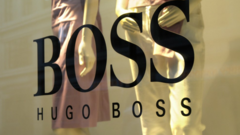Will Hugo Boss Force a Liverpool Pet Store to Rebrand?

## The Legal Battle Over Brand Names: A Case Study on Boss Pets and Hugo Boss
In a world where branding plays a crucial role in business success, the recent legal tussle between a small online pet health supplies shop, Boss Pets, and the global fashion giant Hugo Boss has brought significant attention to trademark laws and brand protection. This case not only highlights the complexities of intellectual property rights but also raises questions about the balance of power between small businesses and corporate giants.
### The Background of the Case
Ben McDonald, a resident of Bootle, Merseyside, launched Boss Pets in February, aiming to provide a range of pet health products to animal lovers. Unfortunately, his entrepreneurial dream was abruptly challenged when he received a legal letter from Hugo Boss, demanding he cease using the name "Boss Pets." The designer brand argued that the use of the term "boss" could cause confusion among consumers and potentially suggest an affiliation between the two companies.
This situation is not uncommon, especially in a marketplace where names and brands can overlap. However, as McDonald expressed, “my whole world collapsed” upon receiving the notice, which indicated that he had just ten days to take down his website or face legal repercussions.
### The Legal Perspective
Hugo Boss, as an international fashion retailer, has a legal obligation to protect its trademark rights worldwide. A spokeswoman for the brand stated, “we are aware that the English word 'boss' is one that is commonly used.” Yet, she emphasized the company's responsibility to monitor and defend its trademark, especially when new registrations may overlap with their existing rights.
From a legal standpoint, several factors influence the outcome of such cases:
#### Trademark Distinctiveness
1. **Fanciful Trademarks**: These are invented words with no prior meaning (e.g., "Kodak").
2. **Arbitrary Trademarks**: Common words used in an unrelated context (e.g., "Apple" for computers).
3. **Suggestive Trademarks**: These hint at the product but require imagination (e.g., "Netflix").
4. **Descriptive Trademarks**: These describe the product (e.g., "Best Coffee").
5. **Generic Trademarks**: Common terms that cannot be legally protected (e.g., "computer").
In this case, "Boss" can be classified as both a descriptive and arbitrary trademark, depending on the context of its use. Hugo Boss may argue that their brand is strong enough to warrant protection even against common usage.
#### Likelihood of Confusion
Courts often analyze whether consumers are likely to be confused about the source of goods or services. Factors considered include:
- Similarity of the marks
- Similarity of the goods or services
- Channels of trade
- Consumer sophistication
In McDonald’s case, his lawyer argues that there is no likelihood of confusion since Boss Pets operates in a completely different sector—pet health supplies compared to Hugo Boss’s fashion retail. This differentiation plays a pivotal role in the defense against the claims made by Hugo Boss.
### The Impact on Small Businesses
This case underscores the challenges faced by small businesses when pitted against established corporations. McDonald described himself as "just a lad from Bootle" who has invested every spare penny into his new venture. The emotional and financial toll of such legal disputes can be overwhelming, particularly for entrepreneurs trying to establish their brands in a competitive market.
#### Emotional and Financial Toll
- **Stress and Anxiety**: Facing legal threats can create immense pressure on small business owners, affecting their mental health and decision-making capabilities.
- **Financial Burden**: Legal fees can escalate quickly, draining resources that could be better spent on business development and marketing.
- **Loss of Brand Identity**: Being forced to change a brand name can undermine the hard work that goes into building a business’s reputation.
Small businesses often lack the resources and legal expertise to navigate complex trademark disputes. This imbalance can lead to a chilling effect on entrepreneurship, as potential business owners may be deterred from launching new ventures due to fear of legal repercussions from larger corporations.
### The Role of Dialogue in Resolving Trademark Disputes
Hugo Boss stated that they typically seek dialogue to reach an amicable solution. This approach is essential in trademark disputes, allowing both parties to negotiate and potentially find a resolution without resorting to litigation. For small businesses, open communication can provide a path forward that minimizes disruption.
#### Potential Resolutions
1. **Coexistence Agreements**: These allow both parties to operate their businesses under their respective trademarks without infringing on each other’s rights.
2. **Rebranding**: In some cases, the smaller business might choose to rebrand to avoid further legal complications.
3. **Licensing Agreements**: Larger corporations may offer to license the trademark to the smaller entity for a fee.
It’s critical for both sides to approach negotiations with an open mind, understanding that a resolution can benefit everyone involved without escalating to a legal battle.
### Conclusion
The case between Boss Pets and Hugo Boss illustrates the complex nature of trademark law and the significant challenges small businesses face when confronted with legal threats from larger corporations. While protecting brand identity is important for established companies, it is equally vital to consider the implications for small entrepreneurs trying to carve out their place in the market.
As McDonald continues to fight for his business, he embodies the spirit of many small business owners who persevere despite daunting obstacles. Moving forward, this case serves as a reminder of the importance of fair competition, the need for dialogue in resolving disputes, and the resilience of small businesses in the face of adversity.
### FAQs
#### What should I do if I receive a trademark infringement letter?
If you receive a trademark infringement letter, it’s essential to consult with a qualified attorney who specializes in intellectual property law. They can help you understand your rights and options.
#### Can a small business trademark a common word?
Yes, a small business can trademark a common word, but it often depends on the context and how distinctive the use of that word is in relation to the goods or services offered.
#### How can small businesses protect their trademarks?
Small businesses can protect their trademarks by registering them with the appropriate government authorities, monitoring their use in the marketplace, and taking action against any infringing parties.
As we delve deeper into the world of branding and trademarks, what are your thoughts on the balance between protecting intellectual property and fostering a fair marketplace?
#TrademarkLaw #SmallBusiness #BrandProtection
Published: 2025-06-23 15:02:34 | Category: technology



